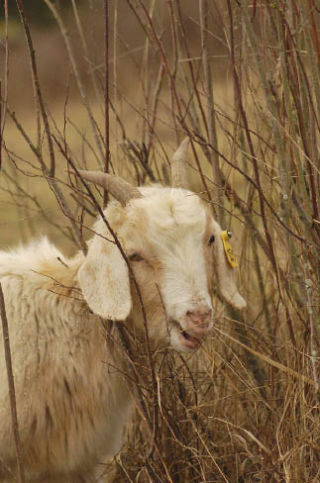In this age of heightened environmental awareness, it’s not uncommon for a company to seek out “green” solutions to age-old problems. Not only does thinking green look good from a public relations standpoint, in many cases it also makes good business sense.
With a green philosophy in mind, Quadrant Homes recently contracted Goat Trimmers LLC to clear brush and overgrowth from three storm water ponds in the Heights neighborhood of Snoqualmie Ridge, in advance of conveying the land back to the city of Snoqualmie.
Quadrant knew of similar projects that had been tackled by goats, and wanted to give Goat Trimmers a try, particularly since the steep terrain would make using traditional machinery difficult and expensive.
“It’s a different approach, it’s a more green approach,” said David Dorothy, vice president of Quadrant Homes.
Goat Trimmers set about the project in mid-November with 150 goats and a few dozen sheep. The goats work well at clearing larger vegetation like leaves, blackberry bushes and weeds, while the sheep take care of trimming grasses.
Also on hand were a pair of guard dogs to protect the herd from predators, and during the day, a supervisor stayed to keep an eye on the animals. Given that the area to be cleared was already fenced off, the only thing Goat Trimmers needed to do was unload the animals and get out of their hungry way.
“We open the trailer and let them eat,” said Don Miller, owner of Goat Trimmers.
And eat they can. Miller said that a herd of 90 goats can clear an acre in as little as a day, depending on how interested they are in the offerings. The thickness of the overgrowth will affect the amount of time required, but a good-sized herd can clear an acre in about three days with no trouble.
Quadrant Homes was satisfied with the results of this slightly unusual approach and would consider using goats again.
“It’s another tool in the toolbox,” Dorothy said.
In particular, Quadrant was happy to be able to take a green approach to this particular problem.
“We pride ourselves on being a sustainable developer,” Dorothy said.
More and more developers and landowners are taking a similar approach. In the Puget Sound region, goats have been used to clear vegetation at Sea-Tac Airport, Renton Airport, and the Renton SuperMall. Dorothy was first exposed to the practice when the city of Kirkland used goats to clear land near his home.
“It’s really catching on,” Miller said.
The goats have several things working in their favor. For businesses and agencies looking for a green approach, they have the benefit of not consuming fossil fuels and pumping carbon emissions into the atmosphere. They also clear land in a natural way, as opposed to the digging, shoving and plowing of machinery.
The goats also have the added benefit of being much quieter than their diesel- and gas-powered equivalents, which can be of particular concern near populated areas.
Goats also work better and cheaper on certain terrains that are difficult for machinery to operate on, such as steep slopes and hilly areas.
A more intangible benefit is people’s reaction to seeing a herd of goats working in their neighborhood. In Miller’s experience, most people get a kick out of being able to walk over to a site, look over the fence and watch the goats nibble away.
Quadrant learned this as well, hearing from many passersby.
“A lot of people thought it was fun to go and watch them,” Dorothy said.
It’s not often a developer gets complimented for doing something fun. But given the increased importance of going green and the realization that it can be both earth-friendly and business-friendly, Valley residents will no doubt hear more about the green benefits of goats.


